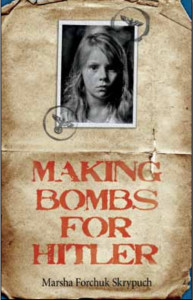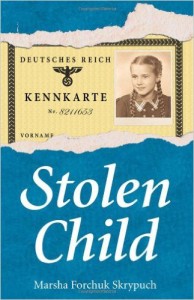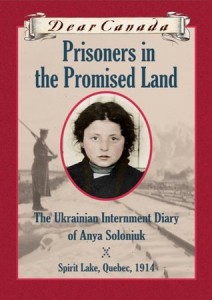 “It is June 1913, when Ali breaks the news to his fiancée Zeynep that he will be leaving their Anatolian village to go to Canada. Once there, he hopes to finally be able to save enough money to pay for her passage, and to build a new life for them there. But the world is on the brink of war and everything soon changes. The two record the events that they both witness in journal entries to each other, even though they both fear that they will never see one another again.
“It is June 1913, when Ali breaks the news to his fiancée Zeynep that he will be leaving their Anatolian village to go to Canada. Once there, he hopes to finally be able to save enough money to pay for her passage, and to build a new life for them there. But the world is on the brink of war and everything soon changes. The two record the events that they both witness in journal entries to each other, even though they both fear that they will never see one another again.
Alternating between these two sets of journal entries, readers learn Zeynep’s story of going to live and work with Christian missionaries. As World War I looms, she witnesses first-hand the horrors of the Armenian genocide at the hands of the Young Turks who now control the government. Conditions for her and the other Alevi Kurds are only marginally better, but that is small consolation as she watches Armenian men, women and children being cruelly treated and marched to their deaths. Meanwhile, in Canada, Ali and the other Alevi Kurds who had tried to settle in Brantford, Ontario, are falsely accused of a crime and sent to an internment camp in northern Ontario. As these two separate stories unfold, a vivid and devastating picture unfolds.
This latest work is an outstanding testament to Skrypuch’s mastery as a writer of historical fiction for young readers. She has created forthright and dramatic accounts of two little-known events from that time period, inviting readers of all ages to try to understand the depth of suffering that these groups have experienced. She has put a profoundly human face on the horrors of war while also creating an insightful portrait of the Alevi Kurds. Zeynep and Ali are both forced to mature very quickly, and their development is convincing. Skrypuch skillfully captures their voices, their longing, their heartbreak and their courage.”
—Lisa Doucet
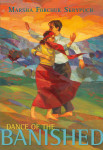 SKRYPUCH, Marsha Forchuk. Dance of the Banished. 288p. Pajama Press. ISBN 9781927485651. JLG Level: PBH : Paperbacks High (Grades 10 & Up).
SKRYPUCH, Marsha Forchuk. Dance of the Banished. 288p. Pajama Press. ISBN 9781927485651. JLG Level: PBH : Paperbacks High (Grades 10 & Up).
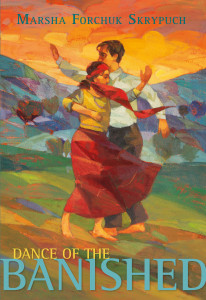 “It is June 1913, when Ali breaks the news to his fiancée Zeynep that he will be leaving their Anatolian village to go to Canada. Once there, he hopes to finally be able to save enough money to pay for her passage, and to build a new life for them there. But the world is on the brink of war and everything soon changes. The two record the events that they both witness in journal entries to each other, even though they both fear that they will never see one another again.
“It is June 1913, when Ali breaks the news to his fiancée Zeynep that he will be leaving their Anatolian village to go to Canada. Once there, he hopes to finally be able to save enough money to pay for her passage, and to build a new life for them there. But the world is on the brink of war and everything soon changes. The two record the events that they both witness in journal entries to each other, even though they both fear that they will never see one another again.

